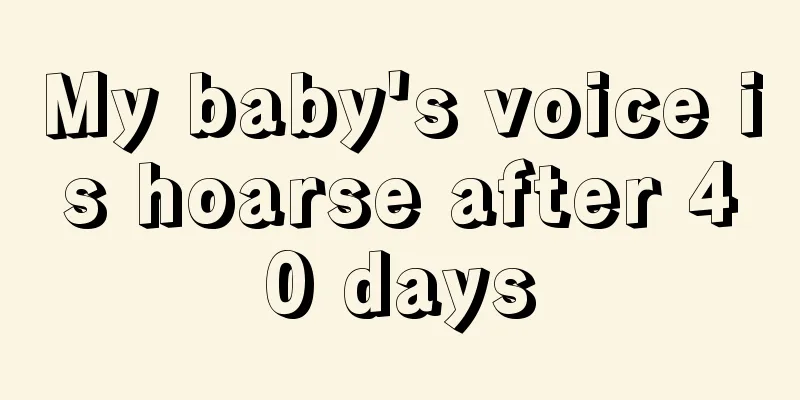What is the normal body temperature for a one month old baby?

|
The temperature regulation function of a one-month-old baby is not yet perfect, so mothers often ask, why is their baby's temperature different every time they measure it? Is the baby sick? Although each child's basal body temperature is different, we usually believe that it is normal for babies under one year old to have a body temperature below 37.5℃, because a one-month-old baby's ability to control body temperature is not strong enough and is easily affected by the ambient temperature. So, what is the normal body temperature for a one-month-old baby? Let’s take a look at it below. The body temperature (rectal temperature) of a newborn baby is between 37.6℃ and 37.8℃ when it is just born. Because the temperature regulation function of newborns is not yet perfect and the ambient temperature is generally low, the child's body temperature drops significantly after birth, which can drop by 2°C to 3°C within half an hour to an hour after birth, and then gradually recovers, fluctuating between 36°C and 37°C. Therefore, special attention should be paid to the temperature of the environment in which the child lives. For normal newborns, the room temperature should be 33°C in the first two days after birth, and then gradually decrease; while for premature infants, the temperature should be 34°C to 35°C in the first period of time, and then gradually decrease, and the rate of decrease is slower than that of normal children (follow the doctor's instructions). At the same time, pay attention to the thickness of children's clothes and quilts to keep their hands and feet warm without sweating. If your child's forehead feels warm when you kiss or touch it, your child may have a fever. From a medical point of view, although each child's basal body temperature is different, the normal body temperature can fluctuate between 35.5℃ and 37.5℃, but if it exceeds 37.5℃, the child should be considered to have a fever. But it doesn’t mean that a child has a fever if his temperature exceeds 37.5℃. Because everyone's basal body temperature is different, some people's basal body temperature is 35℃; some people's basal body temperature is 37℃, or even 37.3℃. The reason is that the center in the baby's brain that controls body temperature regulation is not yet mature, that is, the ability to control body temperature is not strong enough, causing the baby's body temperature to be affected by the ambient temperature. In hot weather or when wrapped too much, body temperature may rise slightly, but should not exceed 37.5°C. In cold weather or in an air-conditioned room with low temperature, body temperature can drop to 36℃ or lower. Moreover, each person's body temperature changes throughout the day depending on their physical and living conditions. Body temperature will rise slightly after eating and exercising, and the amount of activity is positively correlated with the increase in body temperature. In order to understand your own body temperature, it is recommended to measure your basal body temperature. Basal body temperature refers to the body temperature when you wake up in the morning but before you get up and move around. At this time, the human body's metabolism is the lowest and the body temperature is relatively the lowest, so it is useful to understand the basal body temperature. For infants and young children, is a temperature below 37.5℃ considered a fever? It's really hard to say. The reason is that each infant's basal body temperature is different. Because infants and young children have a fast metabolism, their body temperature will be higher than that of adults, and their basal body temperature can be 36-37.5℃. For newborns, a body temperature not exceeding 37.5℃ is normal. Because the functions of newborns' organs, including the brain, are immature and their ability to control their body temperature is limited, if they are wrapped a little more, their body temperature will rise, sometimes up to 38°C. A "slightly high" body temperature is only meaningful when compared with the basal body temperature. Therefore, parents should understand their children's basal body temperature (body temperature in a quiet state). The younger the child, the higher the basal body temperature. However, a small number of newborns will experience so-called "dehydration fever" or "one-time fever" within 3 to 5 days after birth. The body temperature can rise to 39℃~40℃, often lasting for several hours or even 1 to 2 days. The newborn may have red face, dry skin, crying and restlessness. This is due to insufficient water intake, high room temperature or too thick clothes and quilts. Generally, the body temperature will drop quickly by feeding more breast milk or some warm boiled water. If the body temperature does not drop after the above treatment, you should see a doctor. The above content is an introduction to the question of what is the normal body temperature of a one-month-old baby. I believe you will have a certain understanding after reading it. It is recommended to let the baby drink more water, keep warm, avoid catching cold, wipe the baby's body with warm water, and cool down physically. When measuring the baby's temperature, be sure to choose a time when the baby is relatively quiet. It will be inaccurate when the baby has just fed or has cried. The indoor temperature is too high, or the baby is dressed too much, which can also cause a high body temperature. |
<<: What should I do if my one-year-old baby has a fever and the fever doesn’t go away?
>>: Why are newborn babies restless when they sleep?
Recommend
Can children get immunoglobulin?
Some of you may have heard of immunoglobulin, but...
What are the causes of dry cough in three-year-old babies?
The immunity of a 3-year-old baby has just been s...
Baolong Pills for children frightened
Infants and young children are easily frightened ...
What to do if your baby has a persistent low-grade fever
It is quite common for babies to have a fever. If...
Is it normal for children to fart?
Farting is a normal phenomenon. When people fart,...
What should I do if my child is in a rebellious period?
As children grow up, they will show some rebellio...
Children's platelet count is high
Blood contains many components, the three most im...
How to supplement iron deficiency in three-month-old babies
The human body should supplement an appropriate a...
What is the reason why my baby has a white hair?
The birth of a newborn brings a lot of happiness ...
What smart behaviors will a five-month-old baby show?
The baby can already play with the mother when he...
Is nebulization good for children with bronchitis?
Bronchitis may be the most troublesome problem fo...
What can't children with eczema eat?
The main reason why children develop eczema is th...
Can babies with roseola be blown dry?
Parents are very protective of their infants and ...
What should I do if my ten-year-old child is constipated?
When children are growing, if they do not pay att...
Can children grow taller by taking calcium tablets?
In daily life, we often hear many mothers complai...









